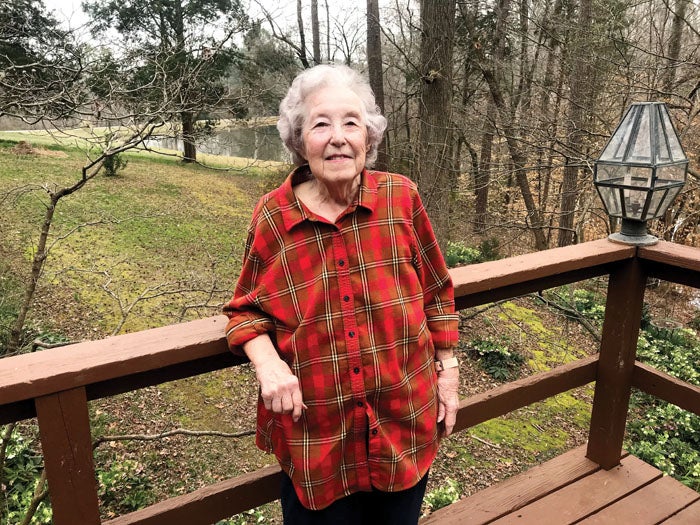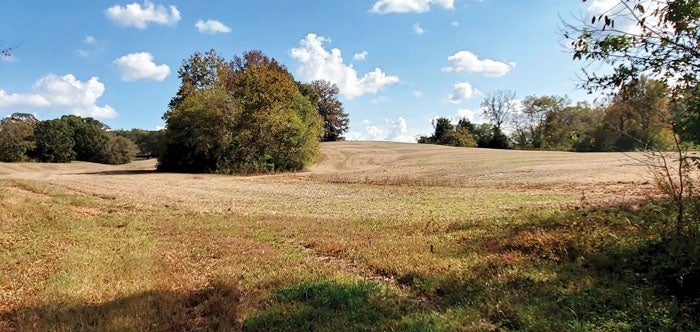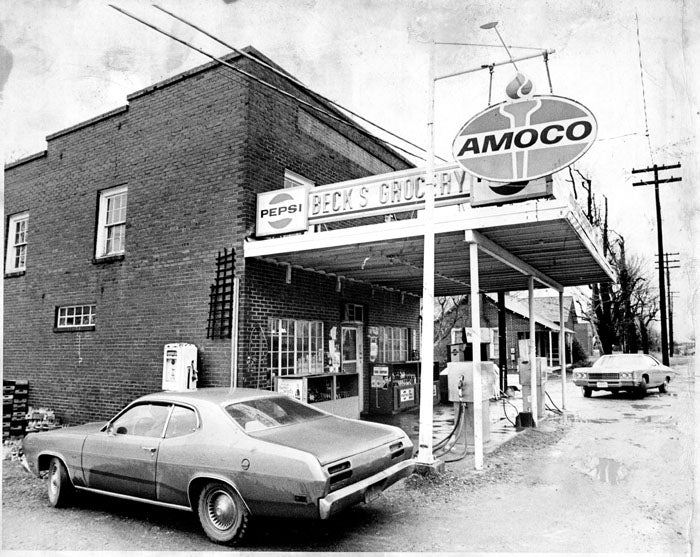Memories of the farm: Jean Messick remembers the early days on the Shallow Ford property
Published 12:10 am Thursday, April 15, 2021

- Jean Messick has lots of stories to share about her days of living on the farm bordering the Shallow Ford segment of the Yadkin River from 1956 to 1961. Photo by Jim Buice, for the Clemmons Courier.
|
Getting your Trinity Audio player ready...
|
Second of a two-part series.
By Jim Buice
For the Clemmons Courier
From having bootleggers as neighbors … to navigating a pasture full of cows with a bull on it … to going on a scary snow sled ride down an icy hill toward the river, Jean Messick has lots of memories of her days living on the “farm” bordering the Shallow Ford segment of the Yadkin River.
Jean and Jim Messick were newlyweds in 1956 — they even spent their honeymoon night out there — when they moved into a house along Williams Road on the property owned at that time by Jim’s dad.
It was a busy time as they started their new life together with Jim as a top executive at Food Fair and Jean going back and forth as a music teacher at Clemmons and Vienna elementary schools while directing the choir at Covenant Presbyterian Church in Winston-Salem.
“It was a lot of work,” Jean said. “Then the kids started coming.”
And things got even busier.
They ended up leaving the farm in 1961 and moving to Winston-Salem, but they never forgot those early roots. The Messicks ultimately bought the Shallow Ford property in 1981 and eventually played a pivotal role in preserving the historic land, which was as a link in the Great Wagon Road and the site of the Battle of Shallow Ford and Stoneman’s Raid.
That happened when they decided to transfer the 246-acre farm property to the Winston-Salem Foundation via a gift deed in 1997 with the intention of preserving the property and making sure, as Jean stated, that it wasn’t “full of houses out there.”

This is a view of the 246-acre farm property in western Forsyth County along the banks of the Yadkin River showing the farm land. Photo by Andy Kelly
The Conversation Fund of Arlington, Virginia, got involved in 2019 and purchased the property for $2.8 million in December 2020 with the goal for it to be used for walking trails and opportunities for canoeing, camping, fishing and passive outdoor recreation.
House Bill 242 and Senate Bill 295 have been introduced this year, and Mike Leonard, a local official for the Conservation Fund, said that the goal is now for the state to contribute $1.8 million to buy the property with the balance coming through donations from a couple of individuals and state foundations.
Jean Messick certainly didn’t have any thoughts or visions of anything like that happening when she lived on the farm many years ago, but she has plenty of stories to share — like on that day when she walked up on a still.
“This was before I had any children,” Jean remembered. “We were on the road, and the bootleggers were farther back on top of the hill. I was walking down a hill and not afraid of anything and was beside this little narrow branch. It was an active branch. I came across the working still. I just kept walking and pretended I didn’t see it.
“I then called my husband. I told him that I walked upon a still. I had to go to the neighbor’s to call because we didn’t have a telephone. He came home, and the still was gone. They had moved it. They were somewhere looking at me. I knew who was doing it. It was my neighbors. I saw them all the time, but I only saw (the still) one time.”
But that was only part of the property.
“We went to the river right much, but we had to go across a cow pasture with in bull on it,” Jean said. “I climbed the fence. That was all pasture for cows for my father-in-law. He just produced cows to sell them. There were 50 or 60 or them but were all around because they made hay on this field this time and cows were over here this time. They swapped them around. It was a real working farm.”
Another adventure came when there was a big snow, and Jean and Jim decided to go sledding … with her being seven months pregnant with their second child.
“I was partly crazy and still am,” Jean said with a laugh. “I’m seven months pregnant, and we took our baby Elizabeth to our neighbors’ house. They lived on the farm. We went down across one of hills over the road down to the river and went flying down there. I thought we would never stop. I knew the sled was going in the river, and I just rolled off the sled and let it go. I was OK. I had Rachel. She was the one that was on the way. I would have gone right in the river. It was real slick and icy.”
Just a couple of months later, the Messicks had started a garden and had two hives of bees.
“Jim decided to rob the bees the night that Rachel was born,” Jean recalled. “Of all the things to do, he put honey in jars and was cutting it up and putting the frames back in for it to go back in the hives. And that’s the biggest, stickiest mess that there could be.
“I came back in the house and I said after cleaning up all that, we should take Elizabeth to town because Rachel might come because she was overdue. Jim took Elizabeth to town and left me at the hospital and took her to his mother’s house, and then the phone rang, and he had a baby.”
Then there was a greenhouse that had staying power … to this day.
“We had flower gardens on the farm, and the year before Elizabeth was born, we built a greenhouse and have moved it five times,” she said. “Now it’s up in the barn. We made a lean-to out of it.”
Jean, 86, remembers the early days when Lewisville hardly qualified as a wide spot in the road.
“There wasn’t even 421 back then,” she said. “I think they built two lanes of it before we left. The only store up there was John Beck’s gas station.”
That was at the intersection of Lewisville-Clemmons Road and Shallowford Road in what is now the heart of town.

Jean Messick recalls the early days in Lewisville when “the only store up there was John Beck’s gas station.” Contributed photo
“He pumped my gas, washed my windows and checked my oil and tires,” she said of the traditional full-service treatment that was the norm back in those days. “There was a post office, and the mill was there where I bought bird feed and corn. There were mostly houses and a couple of churches.”
The Messicks had a third child, James, after leaving the farm and moving to Winston-Salem — where the kids spent most of their growing years — but Lewisville was never far away.
They had bought another tract of land off of Concord Church Road and ended up building a house there and moving back in 1978.
By then, Jim was in the midst of his career at Food Fair, a popular local grocery chain that sold out to Food Lion in 1996. Jean remembers when the first Food Fair came to Lewisville, and “my girls worked there as checkers — the old way with adding machines.”
Jean also recalls the older days in Clemmons when she taught music at Clemmons Elementary in the late 1950s.
“There wasn’t anything in Clemmons then,” she said. “It was pretty much all country.”
When she was teaching music at Clemmons Elementary, she reflected on one day when she was running a little late for school.
“I was driving to Clemmons and was a little bit fast one morning ,” Jean said. “I went along, and the principal of the school said, ‘I saw you coming by.’ The new school (Frank Morgan Elementary) is named for him. He’s the one I taught for.”
Of course, that was a long time ago. The western part of Forsyth County, including Clemmons and Lewisville, has become a booming area of growth with residential developments going up at a record rate.
But that’s the last thing Jean Messick wanted to happen to the beautiful farm land that she called home when she got married nearly 65 years ago.
After the Messicks decided to transfer the property to the Winston-Salem Foundation via a gift deed 24 years ago, they were able to have use of the property to farm it until it was sold to the Conversation Fund several months ago. That allowed the opportunity to then establish an endowment to support multiple local and national charities with Jean having input in the process.
“It’s something that we had wanted to do,” she said of preserving the property as a historic site instead of a residential development. “Then it all came up real fast with the Conservation Fund. We got lucky with our timing and everything.”


